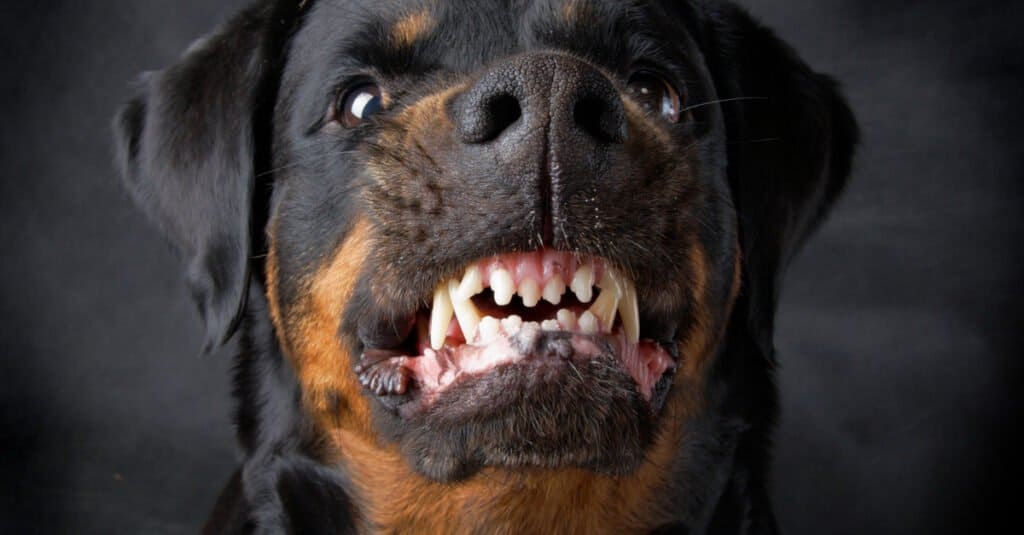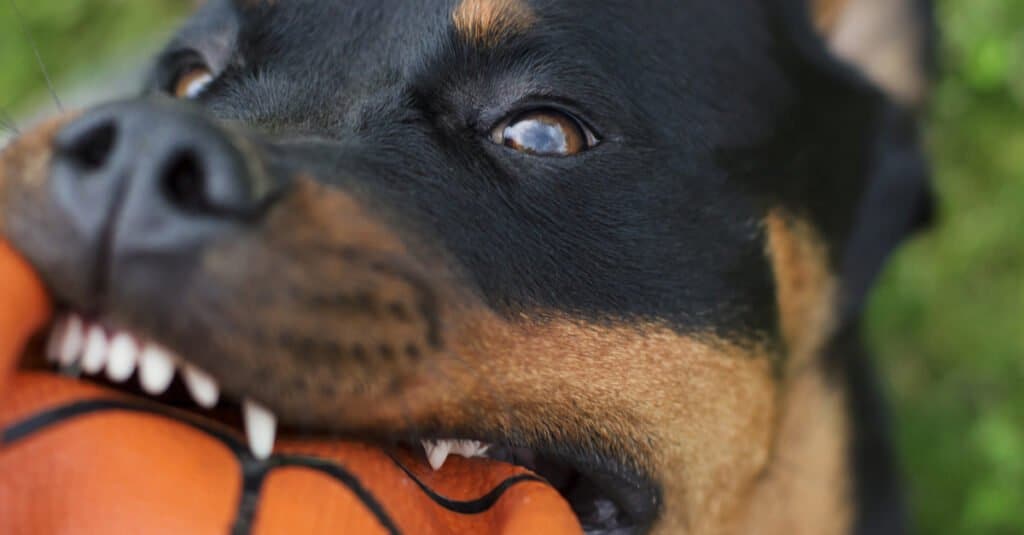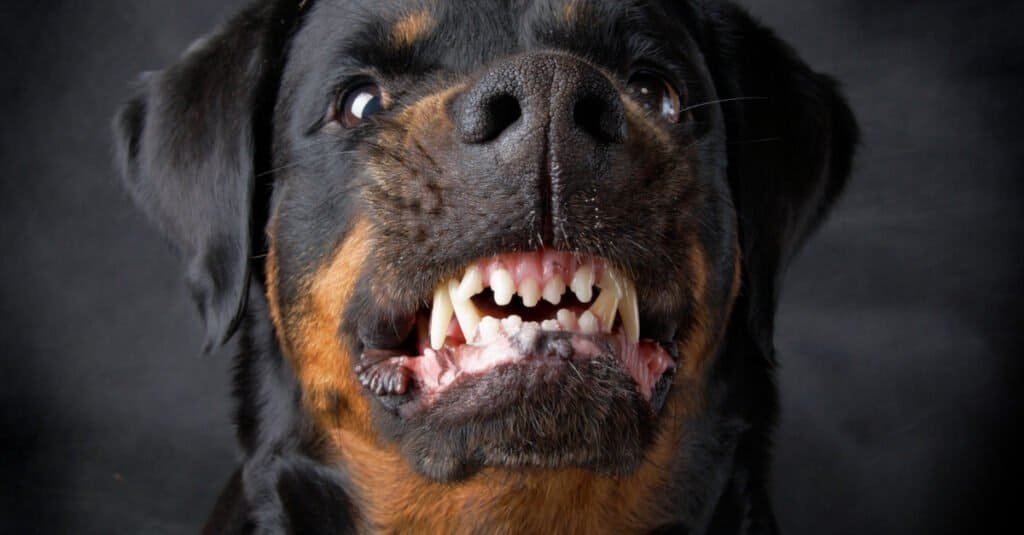If you’re wondering how long it takes for Rottweiler puppies to teethe, you’ve come to the right place! Teething is an exciting and sometimes challenging stage of a puppy’s development. But don’t worry, we’ve got all the information you need to navigate this milestone with ease.
First things first, let’s talk about what teething is. Teething is the process where a puppy’s baby teeth, also called deciduous teeth, start to fall out, making way for their adult teeth. This usually starts around 3 to 4 months of age and continues until they are about 7 months old.
During this stage, you may notice your Rottweiler puppy becoming more prone to chewing, biting, and drooling. It’s completely normal! Teething can be uncomfortable for them, and chewing on toys or appropriate chew items can help alleviate the discomfort.
So, how long does the teething process last for Rottweiler puppies? On average, it takes about 2 to 4 months for a Rottweiler puppy to go through the teething process and have all their adult teeth fully in place. Remember to provide them with plenty of appropriate chew toys and patience during this period. They’ll soon have a beautiful set of healthy adult teeth!

How Long Do Rottweiler Puppies Teeth?
Welcome to our guide on how long Rottweiler puppies teeth! If you’re a proud Rottweiler owner or considering bringing one into your family, it’s essential to understand the teething process and how long it typically lasts. Teething can be a challenging time for both puppies and their owners, but with the right knowledge and preparation, you can navigate this phase smoothly. In this article, we will delve into the duration of teething in Rottweiler puppies, the symptoms to look out for, and tips to help your furry friend through this developmental milestone.
The Teething Process in Rottweiler Puppies
Rottweiler puppies, like all dogs, go through a teething process as their baby teeth are gradually replaced by permanent adult teeth. This process usually begins when the puppies are around three to four months old and continues until they are six to eight months old. During this time, your Rottweiler pup will experience discomfort and urge to chew to alleviate the pain. It’s important to provide appropriate chew toys to satisfy their teething needs and prevent them from damaging furniture or other belongings.
Teething occurs in two stages. The first stage involves the eruption of the incisors, which are the small teeth located at the front of the mouth. These usually come in around three to four months of age. The second stage involves the eruption of the canine teeth and premolars. Canine teeth, also known as fangs, are the long, pointed teeth used for tearing and gripping. Premolars are the teeth behind the canine teeth and are used for chewing. This stage typically occurs between five to seven months of age.
While teething is a natural process, it can cause discomfort and pain for your Rottweiler puppy. They may experience sore gums, drooling, increased chewing behavior, and sometimes even loss of appetite. It’s crucial to monitor your puppy closely during this time and provide them with appropriate relief and care.
Managing Teething Pain in Rottweiler Puppies
As a responsible Rottweiler owner, your role is to help your puppy manage their teething pain and discomfort. Here are some tips to make the teething process more bearable for your furry friend:
1. Provide appropriate chew toys: Offer a selection of durable chew toys specifically designed for teething puppies. These toys can help relieve the pressure on your puppy’s gums and keep them entertained.
2. Use cold items: Chilled chew toys or a wet washcloth placed in the freezer for a few minutes can provide soothing relief for sore gums. However, avoid using frozen items, as they may be too hard and cause more harm than comfort.
3. Offer soft food: If your Rottweiler puppy is having difficulty eating due to teething discomfort, you can temporarily switch to softer foods or soak their kibble in warm water to make it easier to chew and swallow.
4. Practice positive reinforcement: Reward your puppy with praise and treats for chewing on appropriate items, such as their designated chew toys, to reinforce good behavior and redirect their focus from items they shouldn’t chew on.
By implementing these strategies, you can help your Rottweiler puppy through the teething process with minimal discomfort and ensure they grow up with a healthy and strong set of adult teeth.
Caring for Rottweiler Puppies’ Teeth
Teething is just the beginning of your Rottweiler’s dental health journey. It’s crucial to establish good oral hygiene habits from a young age to prevent dental issues in the future. Here’s what you can do to care for your Rottweiler puppy’s teeth:
1. Regular brushing: Introduce tooth brushing to your puppy early on by using a soft-bristled toothbrush and dog-friendly toothpaste. Aim to brush their teeth at least two to three times a week to remove plaque and prevent tartar buildup.
2. Dental chews and treats: Incorporate dental chews and treats into your Rottweiler’s routine to help clean their teeth naturally by reducing plaque and tartar buildup.
3. Annual dental check-ups: Schedule regular dental check-ups with your veterinarian to monitor your Rottweiler’s oral health and address any potential dental issues promptly.
Remember, proper dental care is essential for your Rottweiler’s overall health and well-being. By prioritizing their dental hygiene, you can provide them with a lifetime of healthy teeth and gums.
Canine Dental Health: How Long Do Rottweiler Puppies Teeth?
As a dog owner, it’s essential to understand how long your Rottweiler puppies teeth to ensure their oral health. The teething process is a vital developmental stage for all puppies, and Rottweilers are no exception. By being knowledgeable about the duration and symptoms of teething, you can provide the necessary care and support to your Rottweiler puppy during this phase. Let’s dive deeper into this topic and learn more about what to expect.
Duration of Teething in Rottweiler Puppies
Rottweiler puppies typically start teething when they are around three to four months old. The teething process can last for several months, generally between six to eight months of age. During this time, your Rottweiler puppy’s baby teeth will fall out to make way for their permanent adult teeth.
Teething occurs in two stages. The first stage involves the eruption of the incisors, which are the small front teeth. This stage usually happens around three to four months. The second stage involves the eruption of the canine teeth and premolars, which occurs between five to seven months of age.
It’s essential to keep in mind that these timeframes are rough estimates, and the exact timing may vary from one puppy to another. Some Rottweiler puppies may experience teething earlier, while others may take a bit longer. It’s important to be patient and provide the necessary support during this phase.
Signs and Symptoms of Teething in Rottweiler Puppies
During the teething process, you may notice several signs and symptoms in your Rottweiler puppy. These include:
- Increased chewing: Your puppy may have a strong urge to chew on objects to alleviate the discomfort.
- Drooling: Teething can cause excessive drooling, which is a normal response to sore gums.
- Loss of appetite: Some puppies may experience a temporary loss of appetite due to the discomfort in their mouth.
- Restlessness and irritability: The pain and discomfort of teething can make your puppy more restless and irritable than usual.
- Bleeding, swollen gums: You may notice some bleeding or inflammation in your puppy’s gums as the new teeth come in.
If you observe any excessive bleeding, severe inflammation, or other concerning symptoms, it’s always best to consult with a veterinarian to rule out any underlying issues or complications.
Tips to Help Your Rottweiler Puppy Through Teething
Teething can be a challenging phase for both puppies and their owners. However, there are several strategies you can employ to help your Rottweiler puppy through this stage:
1. Provide appropriate chew toys: Give your puppy a variety of chew toys designed specifically for teething puppies. These toys can help relieve pain and redirect their chewing behavior away from furniture or other inappropriate items.
2. Use cold items for relief: Chilled chew toys or a wet washcloth placed in the freezer for a few minutes can provide soothing relief for sore gums. Avoid using frozen items as they may be too hard and cause more harm than comfort.
3. Offer soft food: If your Rottweiler puppy is having difficulty eating due to teething discomfort, you can temporarily switch to softer foods or soak their kibble in warm water to make it easier to chew and swallow.
4. Practice positive reinforcement: Reward your puppy with praise and treats for chewing on appropriate items, such as their designated chew toys, to reinforce good behavior and redirect their focus from items they shouldn’t chew on.
Remember to be patient and understanding during this phase, as your Rottweiler puppy is going through a natural process of development. With the right care and support, your puppy will have a healthy set of adult teeth and be ready to enjoy a lifetime of happy smiles!
Important Dental Care Tips for Rottweiler Puppies
Proper dental care is crucial for your Rottweiler puppy’s overall health and well-being. By establishing good dental hygiene habits from a young age, you can prevent dental problems and ensure a lifetime of healthy teeth and gums. Here are some essential tips for caring for your Rottweiler puppy’s dental health:
Brushing Your Rottweiler Puppy’s Teeth
Introduce toothbrushing as early as possible to ensure your Rottweiler puppy gets used to the process. Use a soft-bristled toothbrush and dog-friendly toothpaste. Here’s the recommended approach:
- Start by gently massaging your puppy’s gums with your finger for a few seconds each day to get them used to having their mouth touched.
- Once your puppy is comfortable with this, introduce a small amount of toothpaste on your finger and let them taste it.
- Gradually transition to a soft-bristled toothbrush by placing a small amount of toothpaste on the brush and gently brushing their teeth in circular motions.
- Make toothbrushing a positive experience by providing treats or praise afterward.
- Aim to brush your Rottweiler puppy’s teeth at least two to three times a week to remove plaque and prevent tartar buildup.
Include Dental Chews and Treats
Incorporate dental chews and treats into your Rottweiler puppy’s routine to help clean their teeth naturally. These products are designed to reduce plaque and tartar buildup and promote healthy gums. Look for dental chews specifically made for puppies that are appropriate for their age and size.
Schedule Annual Dental Check-ups
Regular dental check-ups with your veterinarian are essential to monitor your Rottweiler puppy’s oral health and catch any potential dental issues early on. Your vet can perform professional cleanings if necessary and provide recommendations for additional dental care.
Establish a Balanced Diet
A nutritious diet plays a significant role in maintaining your Rottweiler puppy’s dental health. Provide a balanced and high-quality diet, including both dry kibble and wet food to promote overall oral health. Avoid feeding your puppy sugary or sticky treats, as they can contribute to dental problems.
Remember, a combination of regular dental care, a balanced diet, and proper chew toys can help keep your Rottweiler puppy’s teeth clean and healthy. By prioritizing their dental health, you can ensure they have a lifetime of strong teeth and fresh breath.
Teething is a natural process in Rottweiler puppies, and understanding its duration and symptoms is crucial for every owner. By providing appropriate care and support, you can help your puppy through this phase smoothly. Additionally, implementing good dental care practices from a young age ensures their oral health throughout their lives. Remember to be patient, observant, and proactive in caring for your Rottweiler puppy’s teeth, and they will grow up with a healthy and radiant smile.
Key Takeaways: How Long Do Rottweiler Puppies Teeth?
- Rottweiler puppies start getting their first set of teeth, also known as milk teeth, at around 3 to 4 weeks of age.
- By the time they are 3 to 4 months old, their milk teeth start falling out, making way for their permanent teeth.
- The process of losing milk teeth and getting permanent teeth can take several months.
- Rottweilers usually have all their permanent teeth by the time they reach 7 to 8 months of age.
- It’s important to support your Rottweiler puppy during teething by providing appropriate chew toys to relieve any discomfort.
Frequently Asked Questions
Are you wondering about the teething process for rottweiler puppies? Below are some common questions and answers to help you understand how long it takes for their teeth to come in and what to expect during this stage.
1. Why do puppies teeth take so long to come in?
The teething process in puppies is similar to human babies. It takes time for the adult teeth to develop underneath the gums, push through, and replace the baby teeth. This natural process can take several months, and for rottweiler puppies, it typically starts at around three to four months of age. The gradual replacement of baby teeth with adult teeth allows for proper growth and development.
It’s important to note that the timeline for teething can vary from one puppy to another. Some puppies may experience a shorter teething period, while others may take longer. It also depends on factors like genetics and overall health. If you have concerns about your puppy’s teething progress, consult with your veterinarian.
2. How long does the teething process last for rottweiler puppies?
The teething process for rottweiler puppies typically lasts for about four to six months. During this time, their baby teeth will gradually fall out and be replaced by permanent adult teeth. The timing can vary for each puppy, but by the age of six to seven months, most rottweilers will have their adult teeth fully in place.
It’s essential to provide appropriate chew toys and dental care during this period to promote healthy teething. Regularly check your puppy’s mouth for any signs of discomfort or issues, and consult with your veterinarian if you have any concerns.
3. What are the signs that a rottweiler puppy is teething?
Rottweiler puppies, like most puppies, may show some signs of teething discomfort. Common signs to look out for include increased chewing behavior, biting or mouthing more than usual, drooling, swollen gums, and occasional bleeding when the teeth are breaking through. You may also notice your puppy having a decreased appetite or being more irritable during this time.
Providing appropriate chew toys, teething rings, and frozen treats can help alleviate the discomfort and provide relief for your puppy. It’s important to ensure the toys are safe and suitable for puppies to chew on, as some toys may be too hard and cause injury. Consulting with your veterinarian can help you choose the right toys for your rottweiler puppy.
4. How can I help my rottweiler puppy during the teething process?
There are several ways you can help your rottweiler puppy during the teething process. Firstly, provide them with appropriate chew toys and teething rings to satisfy their natural urge to chew and help alleviate discomfort. Make sure these toys are safe and suitable for puppies, avoiding small parts or toys that could be easily swallowed.
You can also try freezing toys or wetting them with water to provide additional relief for your puppy’s sore gums. Supervise your puppy while they are chewing to prevent any accidents or ingestion of unsafe objects. Regularly brushing your puppy’s teeth with a dog-friendly toothbrush and toothpaste can also help maintain good oral hygiene during this stage.
5. Can I give my rottweiler puppy any pain relief during teething?
It is generally not recommended to give over-the-counter human pain medications to your rottweiler puppy without consulting a veterinarian. Pain medications designed for humans can be toxic to dogs, and the dosage and potential side effects may differ for puppies.
If you believe your puppy is experiencing significant discomfort during the teething process, it’s best to consult with your veterinarian. They can assess the situation and recommend appropriate pain relief options if necessary. They may suggest safe, dog-specific products or techniques to help manage any discomfort your puppy may be experiencing.

3 Reasons Why We DON’T Recommend Rottweilers
Summary
Rottweiler puppies start teething around 3-4 months old and their adult teeth will come in by 6-8 months. During this time, they may experience discomfort and chew on things to alleviate it. It’s important to provide appropriate chew toys and monitor their teeth for any issues.
Regular dental care, like brushing their teeth and providing dental treats, is crucial to maintain their oral health. Remember, every dog is different, so consult with a veterinarian for guidance on your specific Rottweiler puppy.
